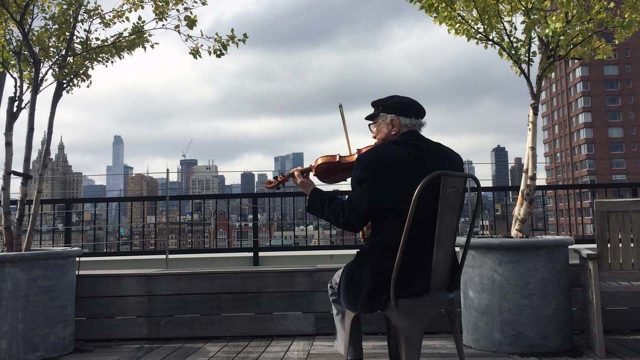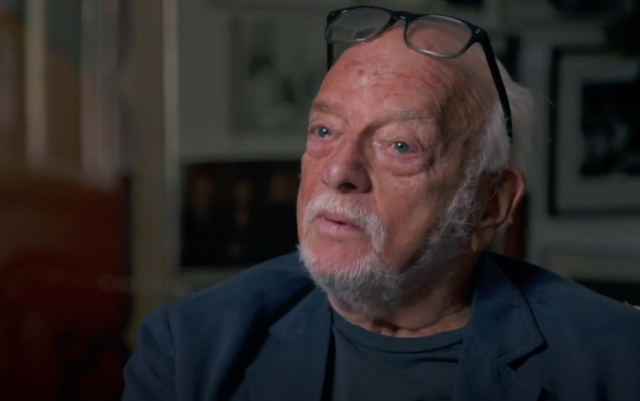
Fiddler on the Roof lyricist Sheldon Harnick plays the violin in new documentary about history of the show
FIDDLER: A MIRACLE OF MIRACLES (Max Lewkowicz, 2019)
Quad Cinema, 34 West 13th St. between Fifth & Sixth Aves., 212-255-2243
The Landmark at 57 West, 657 West 57th St. at Twelfth Ave.
Opens Friday, August 23
thefiddlerfilm.com
 I’ve always felt a deep connection to Fiddler on the Roof, one of the most popular and critically successful musicals in history. I was awed by the movie when I was a kid, listened over and over to the original Broadway cast recording (on cassette!), and have enjoyed several stage productions, including one at a Long Island synagogue when I was a teen, one in Yiddish, and two on the Great White Way. I always assumed that it was because of my Eastern European Jewish roots; my grandparents on one side and great grandparents on the other escaped from pogroms in shtetls not unlike Anatevka, the small, tight-knit community in Ukraine where the show takes place. But as the new documentary Fiddler: A Miracle of Miracles reveals, the story is far more universal. “What is that that makes it speak in so many languages, and everybody thinks it’s about them,” Joel Grey, director of the smash Yiddish version running at Stage 42, says in the film. Theater critic Charles Isherwood points out, “Fiddler is really not just about violence that is visited on a single person but violence that is visited on an entire culture. Really it’s about what we now call ethnic cleansing, in the end, and these forces are still very much alive in the world. Bigotry, oppression, sometimes disguised as mere conservatism, it’s eerily and perhaps sadly relevant today.”
I’ve always felt a deep connection to Fiddler on the Roof, one of the most popular and critically successful musicals in history. I was awed by the movie when I was a kid, listened over and over to the original Broadway cast recording (on cassette!), and have enjoyed several stage productions, including one at a Long Island synagogue when I was a teen, one in Yiddish, and two on the Great White Way. I always assumed that it was because of my Eastern European Jewish roots; my grandparents on one side and great grandparents on the other escaped from pogroms in shtetls not unlike Anatevka, the small, tight-knit community in Ukraine where the show takes place. But as the new documentary Fiddler: A Miracle of Miracles reveals, the story is far more universal. “What is that that makes it speak in so many languages, and everybody thinks it’s about them,” Joel Grey, director of the smash Yiddish version running at Stage 42, says in the film. Theater critic Charles Isherwood points out, “Fiddler is really not just about violence that is visited on a single person but violence that is visited on an entire culture. Really it’s about what we now call ethnic cleansing, in the end, and these forces are still very much alive in the world. Bigotry, oppression, sometimes disguised as mere conservatism, it’s eerily and perhaps sadly relevant today.”

Producer Hal Prince explains the legacy of Fiddler in A Miracles of Miracles
In the documentary, director Max Lewkowicz (Underfire: The Untold Story of Pfc. Tony Vaccaro), whose mother is a Holocaust survivor, explores the creation of the Broadway musical, which was based on the Tevye the milkman stories by Sholem Aleichem and features a score by Jerry Bock, lyrics by Sheldon Harnick, book by Joseph Stein, and direction and choreography by Jerome Robbins, as well as examining its lasting international influence. He shifts between 1905, the time when the show is set; 1964, when it opened on Broadway; and today, where a production can be seen somewhere around the globe every day. He has amassed a treasure trove of archival footage, including old television appearances, a recording of Aleichem narrating one of his tales, a scene from the 1939 Yiddish drama Tevya, original Marc Chagall-inspired set designs by Boris Aronson, and the tape of music that Bock would send to Harnick so he could write the words (instead of working together at the piano).
He combines old interviews, photos, and clips of Bock, Stein, Robbins, and Tevye originator Zero Mostel with new interviews with Harnick (who plays a violin on a New York City roof), the late producer Harold Prince, violinist Itzhak Perlman, Fiddler fans Stephen Sondheim and Lin-Manuel Miranda, and numerous actors and directors affiliated with the show: Austin Pendleton and Joanna Merlin from the original 1964 cast, Topol and Norman Jewison (who is not Jewish) from the 1971 Oscar-winning film, Harvey Fierstein from the 2005-6 iteration, Danny Burstein, Jessica Hecht, Bartlett Sher, Adam Kantor, and Michael C. Bernardi — whose father, Herschel, portrayed Tevye on Broadway in 1964 and 1981 — from the 2016 version, and the current Yiddish Tevye, Steven Skybell. Authors Jan Lisa Huttner and Alisa Solomon put the story in sociopolitical context by relating it to the civil rights and women’s movements of the 1960s and ’70s.
Lewkowicz and editor Joseph Borruso also interweave footage from Fiddler productions in the Netherlands, Japan, Canada, Thailand, England, Brooklyn Middle School 447, and other locations, emphasizing again the universality of the story, particularly in light of today’s refugee crisis, the rise of anti-Semitism and racism, images of immigrant children being ripped out of their parents’ arms, and the cultural need to hold on to tradition and personal connection in the age of social media and the internet. “In moments of great upheaval, Fiddler is always going to seem relevant because the world is changing faster than we can understand,” Miranda, whose In the Heights was partially inspired by Fiddler, explains. “And that’s what the show’s about, and it’s intensely accessible because we are going through times of great change and great upheaval.” And, of course, there’s the music itself, as the film delves into such classic songs as “Matchmaker, Matchmaker,” “Sunrise, Sunset,” “Sabbath Prayer,” “Tradition,” “To Life,” “If I Were a Rich Man,” and “Do You Love Me?” Perhaps the best thing about Fiddler: A Miracle of Miracles, which opens today at the Quad and the Landmark at 57 West, is that it has given me an even greater appreciation of the musical’s endless wonders, which I didn’t think possible. I’ve also learned that it’s not just mine, but I guess I can share it with everyone else.